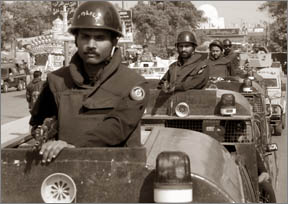|
observer |
|
|
|
|
|
OTHER LINKS |

|

|

|
Pakistan Taleban vow more violencePro-Taleban militants have been strengthening their hold in Pakistan's tribal areas following controversial peace deals with the authorities.
Haroon Rashid of the BBC's Urdu service is one of the few reporters working for a Western media organisation with access to the area. Local militants took journalists to see the site of an air raid by Pakistan's armed forces in troubled South Waziristan region. Here, our reporter describes his meeting with the militants' leader. *After visiting the site of the bombing, we were done with the basic purpose of the trip. I asked the militants if I could see their leader, Baitullah Mehsud. "For that, you will have to spend the night here. We will have to track him down. He is extremely busy these days," said one of the militants, Zulfikar Mehsud, who carried a powerful walkie-talkie. The journey back to the town of Mir Ali from the site of the attack in a hamlet called Kot Kalay was eventless, except for the speed at which Zulfiqar drove the four-by-four. He said driving at 100kph was the norm on these dodgy tracks. Given the battering the Toyota truck was taking, I asked them how long such trucks last? Eight to nine months only, I was told. Close to midnight, we approached a check point but the paramilitary soldier removed the road blockade without even throwing a cursory glance at us. The Taleban, too, looked neither too concerned at the check posts or security forces on the ground, or about the spy planes hovering overhead. Since the controversial peace accords, they say they are able to move around the area freely. In Mir Ali, we bade farewell to the rest of the journalists since the interview with Baitullah was for the BBC only. After spending a night in a room with at least 10 militants, I headed for Baitullah's base somewhere in South Waziristan. This was to be my second meeting with the militant leader in almost two years. Our first encounter was in February 2005 during the signing ceremony of the peace deal at Sararogha. But my current meeting was to take place at a time when the deal is under intense pressure. 'Jihad'Many say Baitullah Mehsud and the supreme leader of the Taleban, Mullah Omar, have several similarities. Both have fought against the Soviet occupation, both are against photographs, both vow jihad and both keep moving from one hideout to another. As we were preparing to leave to meet Baitullah, a man came to the militants and handed over a small blue plastic bag. "This is how Allah takes care of our needs. This is money. Half a million Pakistani rupees [more than $8,200]," Zulfiqar said. I asked who gave it to him. "Someone," was his brief answer. Baitullah's private army along with other militant groups have imposed a strict Islamic code in North and parts of South Waziristan. They run a parallel government here. Music and videos are banned while militants claim people approach them for settlement of their disputes. With a black-dyed beard, 34-year-old Baitullah greeted us in a big room with several of his armed men beside him. We sat on a new colourful quilt spread on the ground. Baitullah seemed a man with only jihad (holy war) on his mind. During the interview he quoted several verses from the Koran to defend his stance that foreign forces must be evicted from Islamic countries. "Allah on 480 occasions in the Holy Koran extols Muslims to wage jihad. We only fulfil God's orders. Only jihad can bring peace to the world," he says. The militant leader on several occasions in the past had openly admitted crossing over into Afghanistan to fight foreign troops. "We will continue our struggle until foreign troops are thrown out. Then we will attack them in the US and Britain until they either accept Islam or agree to pay jazia (a tax in Islam for non-Muslims living in an Islamic state)." Suicide bombersBaitullah predicted an even bloodier year for foreign forces in Afghanistan. "The mujahideen will carry out even more severe attacks. If they [the West] have air power we have fidayeen [suicide bombers]... They will leave dishonoured." The militant leader, who is suffering from a chest infection, denied an American general's claim that a Taleban leader, Jalaluddin Haqqani, was present in the tribal region and was organising attacks across the border. "This is all lies. They don't have any evidence." The militants say they don't wish to fight Pakistani security forces because it only benefits the Americans. "[Pakistan army spokesman] Shaukat Sultan holds the key to this issue," a smiling Baitullah said when asked what they would do if Pakistan continued to bomb them. After an hour-long discussion and a sumptuous tea, we headed back to Peshawar. Before we left, Baitullah gave us perfume and a book in Urdu on 'Why Jihad is a must'. On our way back, we saw newly built white graves on the roadside. White Taleban flags fluttered over several of them. "These graves are of martyrs from Afghanistan," Zulfikar said as we said goodbye. |










